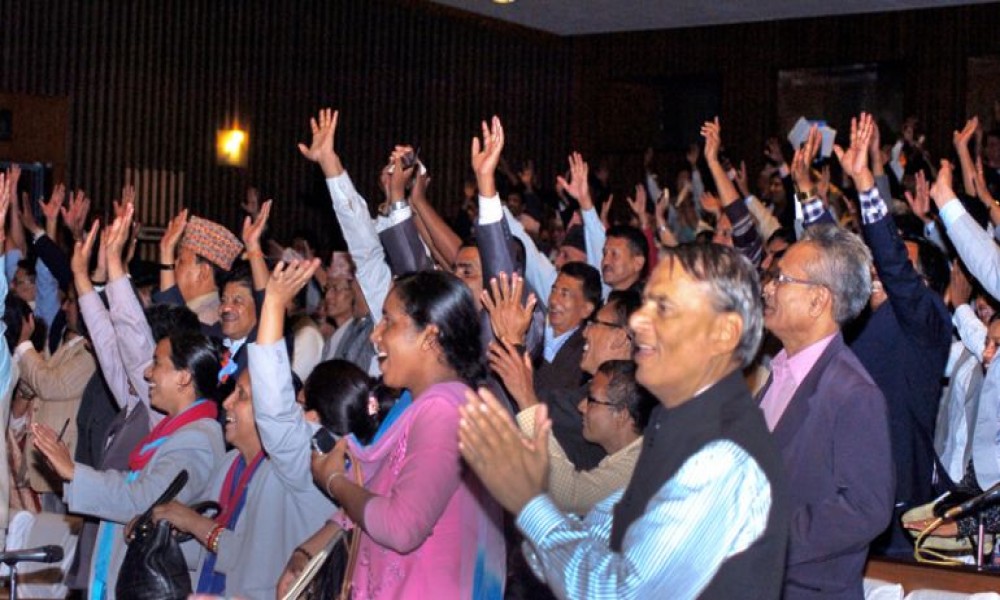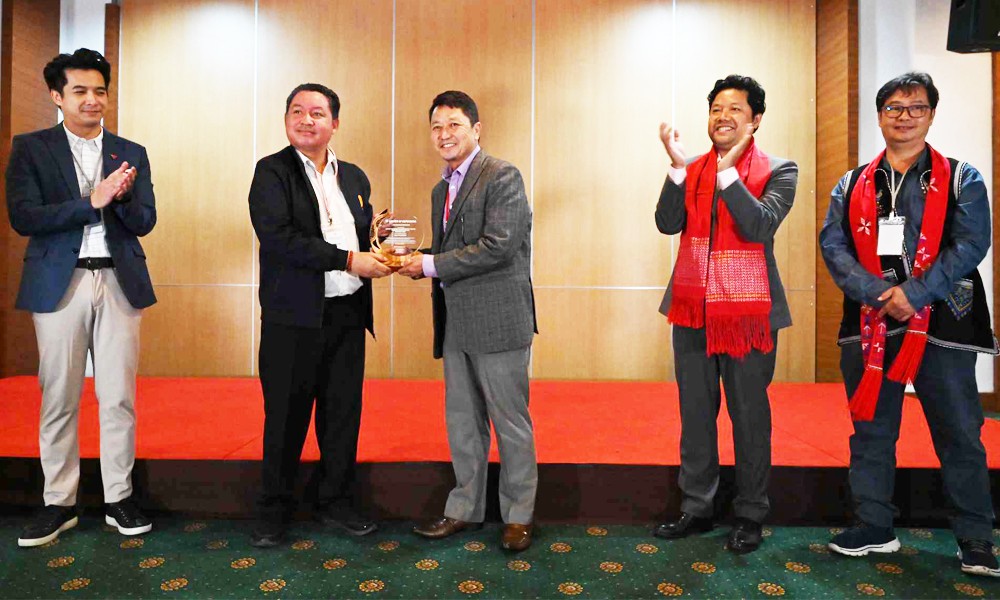President Dr Ram Baran Yadav promulgated Nepal's Constitution 2015 amidst a special ceremony in the Constituent Assembly hall on Sunday. The
Interim Constitution, 2007 has been annulled, following the promulgation of new Constitution.
With the promulgation of the constitution containing 35 sections, 308 Articles and 9 Annexes, Nepal has become a federal democratic republic.
Two-thirds majority of CA members endorsed it and out of 598 CA members, as many as 537 have signed the new constitution.
After passing the new constitution, the CA has been dissolved, and altered into Legislature Parliament, as per the Article 296 of a new Constitution.
Addressing to the special ceremony, President Dr. Yadhav congratulated Nepali for new constitution and said that nearly 6-decade long dream of Nepali people to write new Constitution through democratic process has been realized. He further stressed the need for unity among the diversity and expressed his hope that the new constitution will end all forms of discrimination and disparities.
After promulgation of Constitution, UCPN-Maoist leader Baburam Bhattrai said thatit is not time to be happy enough as half of the population are against the promulgation of the Constitution that does not include their rights and address their aspirations.
Seventh Constitution
Nepal's Constitution 2015 is the first charter to be drafted by a Constituent Assembly. All the previous constitutions were proclaimed under the special decree of King.
Nepal's Constitution 2015 is the seventh constitution that the Himalayan nation has adopted. The Government of Nepal Act 1948 was the first Constitution of Nepal propagated by the then Rana Prime Minister Mohan Samsher Rana.
The second Constitution was for an interim period and was proclaimed by the then King Tribhuvan Bir Bikram Shaha in 1951.
In 1959 and 1961, the then King Mahendra proclaimed two Constitutions--the Constitution of the Kingdom of Nepal, and the Constitution of Nepal.
With restoration of multiparty democracy in 1991, the then King Mahendra promulgated the fifth Constitution of Nepal, which was replaced by the Interim Constitution 2007.
Nepal's Constitution 2015 is the first charter to be drafted by a Constituent Assembly. All the previous constitutions were proclaimed under the special decree of King.
Definition of 'Nation'
The Constitution defines Nepal as a country with multi-racial, multi-lingual, multi-religious, multi-cultural characteristics, geographical diversity with common aspirations and being united by a bond of allegiance to national independence, integrity, national interest and prosperity of Nepal, all the Nepalese people collectively constitute the 'Nation'.
Following the promulgation, all languages being spoken in Nepal are termed to be national languages, but Nepali Khas language will be the official language of the nation.
The Constitution provisions as many as 31 fundamental rights and provisions that each citizen shall be equal before the law. The Constitution also stipulates religious freedom, under which each individual shall have right to profess, practice and protect the religion he or she has faith on it.
Free education up to higher secondary level.
All languages being spoken in Nepal are termed to be national languages, but Nepali Khas language will be the official language of the nation.
The new Constitution has guaranteed the citizen's right to free education up to higher secondary level. Similarly, the Social Justice, under fundamental rights, the constitution has guaranteed the equal participation of each socially backward community and citizen to participate in the state apparatus through inclusion.
The constitution has stipulated the parliamentary forms of government. The Constitution has stipulated bi-cameral parliament. There will be a total 275 in the lower house whereas 59 parliamentarian in the upper house. Out of total 275 parliamentarians represented in lower house, 165 will be elected through first-past-to the post electoral system, where as 110 parliamentarian will represent through proportionate representation.
The constitution has made progressive provision related to women. The Constitution has made compulsory provision both in lower and upper houses, if a chairperson is male then vice-chair shall be women.
Seven provinces
The Constitution stipulates that there shall be seven-federal provinces. The provincial parliament, after the election shall give the name of the province. There shall be double number of parliamentarians in the each parliament of the province in comparison to federal/central parliament. Similarly, the Constitution also stipulates to form a special protected and autonomous region for the protection of social, culture and their development.
Formation of village committee
The constitution has stipulated to form among others separate commissions for Tharu, Dalits, Madhesi, Women, Muslim and Commission of Indigenous Peoples.
The constitution has stipulated to form municipality and village committee in order to exercise the state power in the local level. The constitution stipulates to ensure participation based on the theory of inclusive participation.
Appointment of new PM
The constitution provisions, there shall be appointment of new president, vice-president, chairperson and vice-chairperson of legislative parliament, after promulgation of a new constitution. The existing Constituent Assembly shall be altered into legislative-parliament. The Constitution stipulates that within 7-days of the first meeting of the legislative parliament, new Prime Minister shall appointed, within 20 days, there shall be appointment of chairperson and vice-chairperson of legislative-parliament, and within one month, there shall be appointment of president and vice-president.
Flexible Constitution
Except for issues relating to national integrity, sovereignty, independency, sovereignty vested to general people all others can be amended. The proposal for amendment of any provision of the Constitution can be tabled at any house.
Formation of commission
The constitution has stipulated to form among others separate commissions for Tharu, Dalits, Madhesi, Women, Muslim and Commission of Indigenous Peoples.









